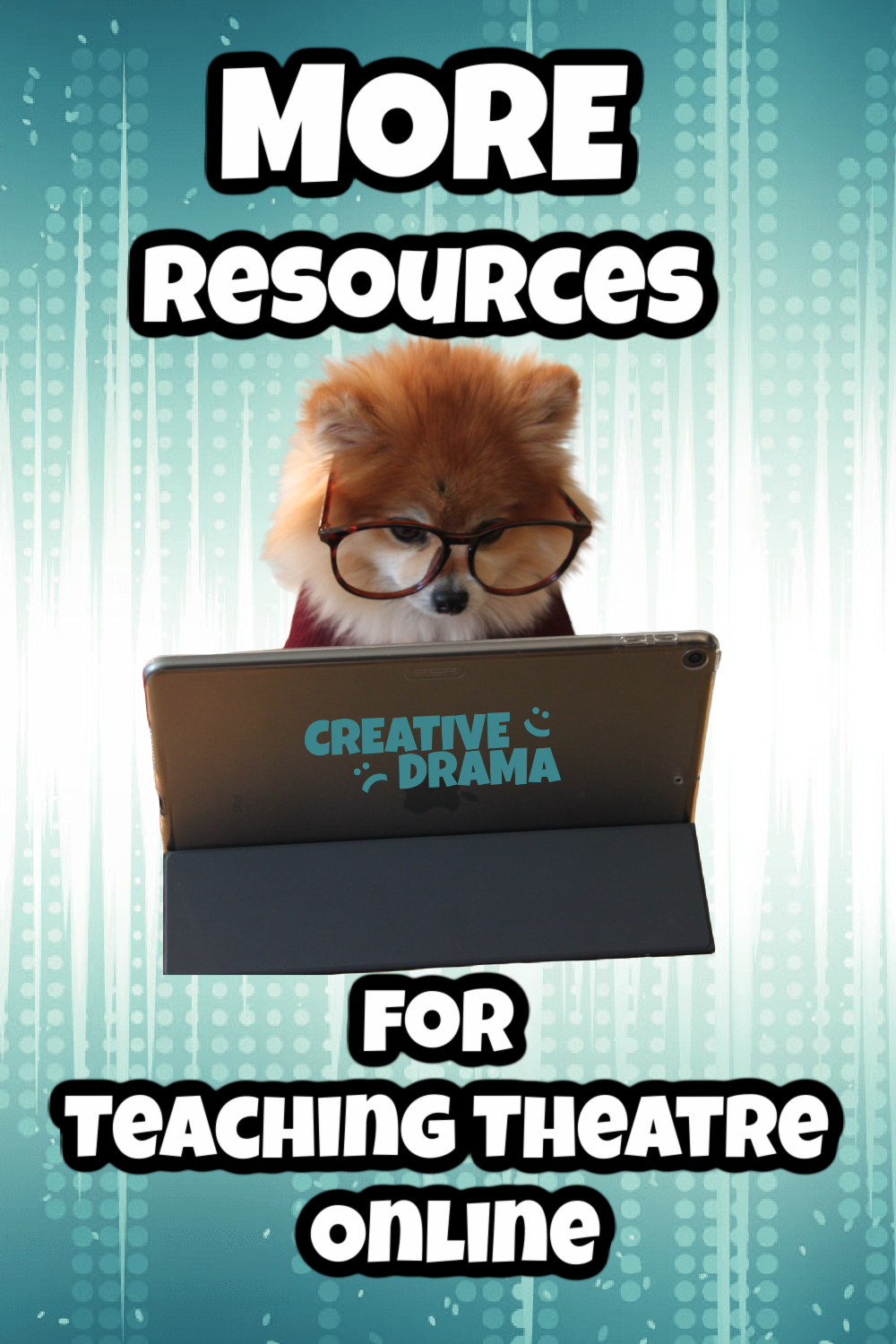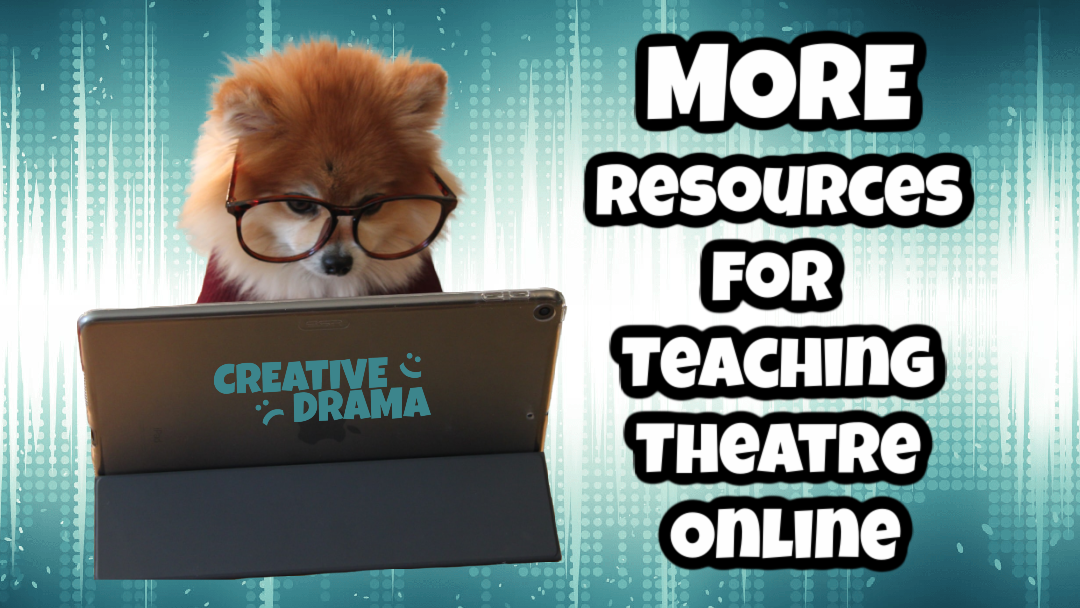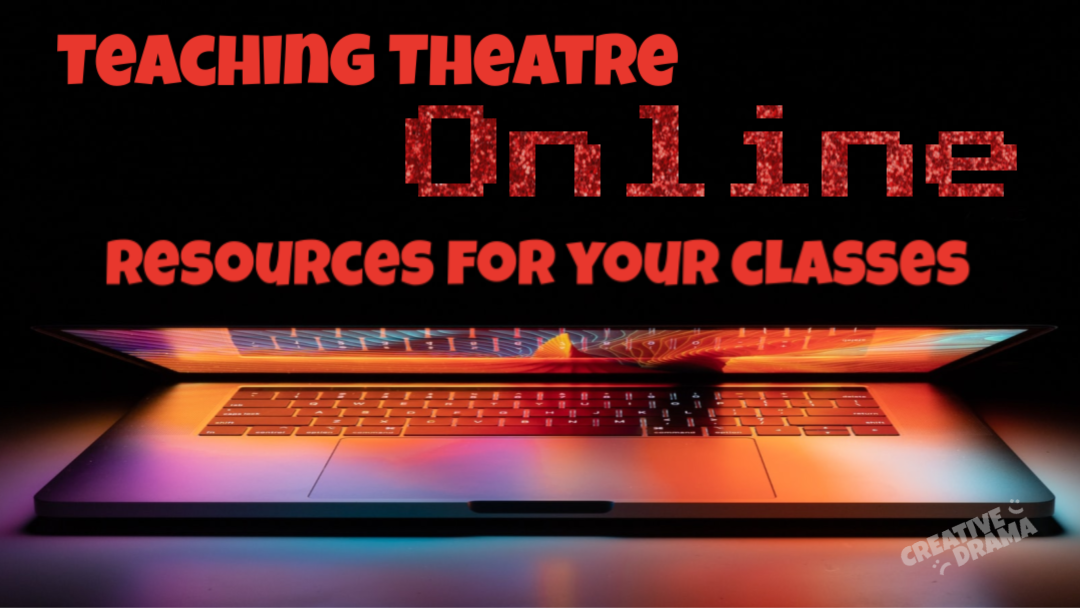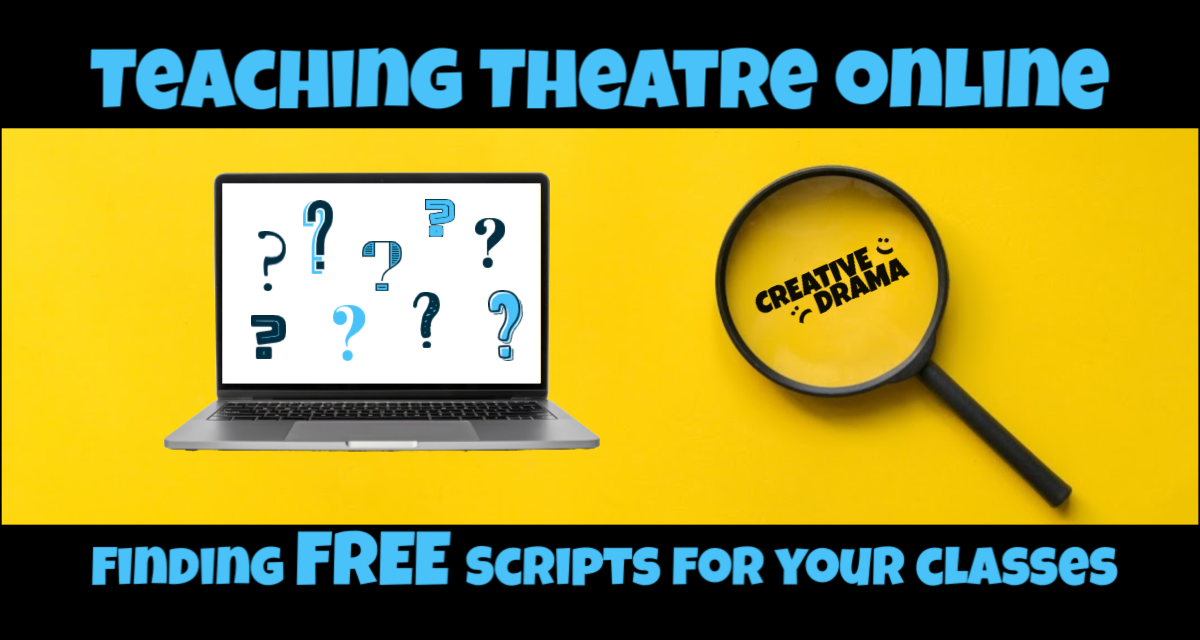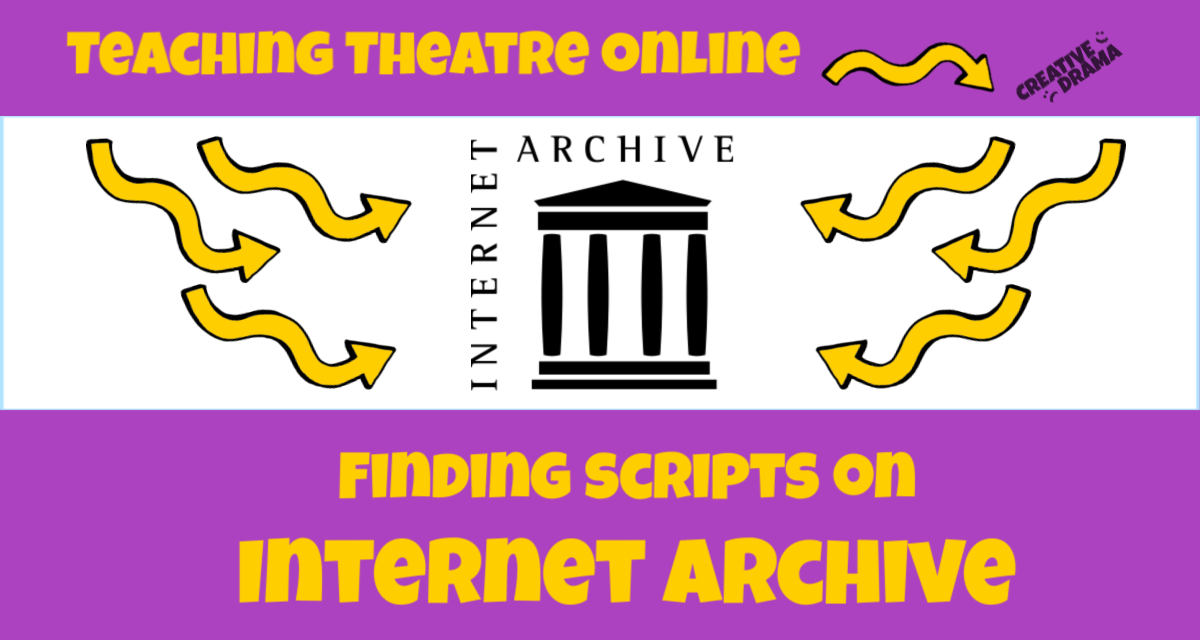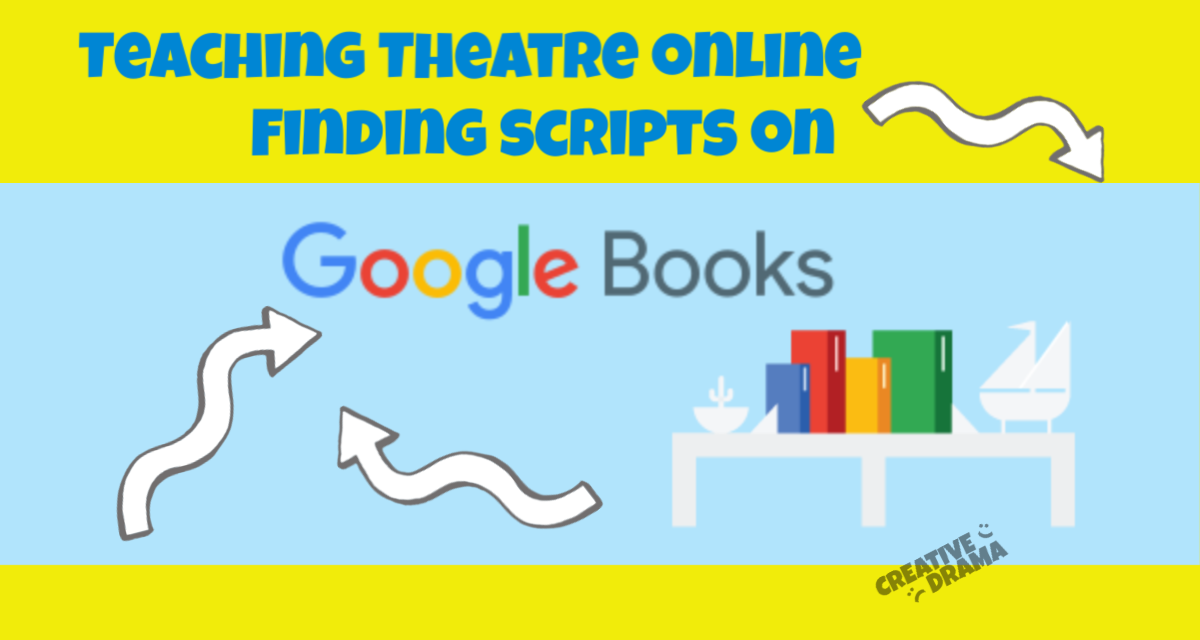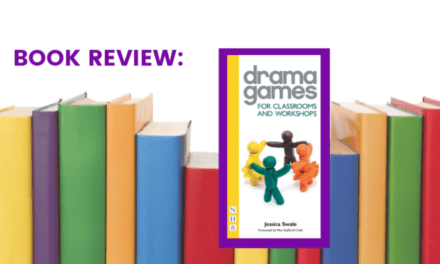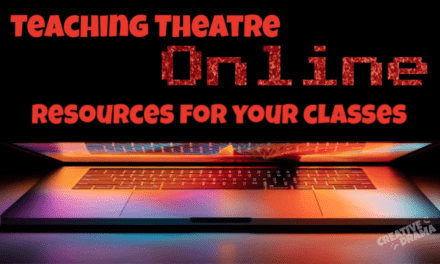It’s been almost five months since I posted Teaching Theatre Online: Resources for Your Classes. Teachers at all levels continue to develop lesson plans for delivery in virtual teaching and learning environments.
Here are some additional resources for teaching theatre online. Most of these are free and easily accessed by students.
GETTING STARTED
“Teach Your Class Online: The Basics” is a free course for teachers from Stanford Continuing Studies.
The Teacher Guide to Online Learning from Michigan Virtual Learning Institute has a well-organized and thorough explanation of teaching online.
Lessons from the Field: Remote Learning Guidance from The California Department of Education is a comprehensive guide for teachers. There’s lots of useful information here on teaching online in general as well!
ACCESSIBILITY
It’s been difficult to find resources specific to “teaching theatre online” for students with special needs. But here are places where the information is adaptable to your current situation.
Educating All Learners has “Resources and Guidance” for teachers. The links tend to address one challenge at a time, but there are pieces on many of the disabilities teacher-directors encounter in their classes.
The National Endowment for the Arts has a list of tips, questions, and resources designed for producing organizations ensuring that virtual events and exhibits are accessible.
Lessons from the Field: Remote Learning Guidance from The California Department of Education has several tips for teachers who have students with IEPs and/or 504s in the Accessibility section (scroll down almost halfway on the page).
The Teacher Guide to Online Learning from Michigan Virtual Learning Institute has a section titled “Meeting Secondary Students’ Special Needs” in the Table of Contents.
A strategy that teachers often use to accommodate the needs of all learners is presenting materials using multiple modalities (visual, aural, read/write, kinesthetic). VARK has a guide to using the modalities in an online learning environment.
If you have a resource for teaching theatre online for students with special needs, let me know!
WEBSITES
The following websites have videos, lesson plans, project ideas, and curricular connections that have direct suggestions for teaching online, or are easily adaptable.
EdSITEment
I can’t believe I forgot to include EdSITEment in my original post; it’s been a favorite of mine for almost two decades. The National Endowment for the Humanities has lesson plans across all the humanities disciplines.
Enter “theatre” into the main search box and you’ll get results that have theatre-related activities in addition to those with drama subjects.
Lesson plans feature Common Core Content Standards, preparation for the teacher – with materials, the activities, and extensions for students.
Some highlights include:
- The Meaning Behind the Mask – a K-5 arts integration lesson that incorporates art, drama, and literature.
- A unit on Tennessee Williams’ The Glass Menagerie and Expressionist Theatre
- Dramatic and Theatrical Aspects in Thornton Wilder’s Our Town
- Being in the Noh: An Introduction to Japanese Plays – A lesson for 9-12 grade students in the elements and conventions of Noh theatre.
- “Not of an Age, but for All Time” – Teaching Shakespeare – A teacher guide that includes 10 different lessons on plays including Romeo and Juliet, A Midsummer Night’s Dream, and Hamlet.
Edutopia
Edutopia, the George Lucas Educational Foundation’s online presence, has content across a wide range of topics.
Here’s their Online Learning section, with articles about green screens, improving distance learning for students with IEPs, and instructional design for distance learning.
Theatre-specific articles:
- Go National: Collaborative Distance Learning
- Teaching Students to Re-Dream with Shakespeare – Rick Taylor introduces a guided imagery technique for time-travelling to Elizabethan England. (Note: Taylor’s link to the “Shakespeare Fellowship” is broken).
- Writing Aloud: Staging Plays for Active Learning – Alexandra R. Moses discusses some exemplary student playwriting projects and provides resources.
- Teachers Shake Up Shakespeare with Digital Media – Russell Scott Smith wrote this piece a decade ago, but it’s certainly timely for 2020!
Other Websites
Teaching Tolerance has a unit plan, The Power of Persuasion in Speech and Theater Through the Lens of Diversity, that incorporates some dramatic pedagogy.
Interesting articles on Teaching Tolerance include:
- “Flipping the Script on Bias and Bullies” – using Theatre of the Oppressed and Forum Theater techniques
- “A Different Kind of Pedagogy” – how teachers can use process drama to help students learn about social justice
- “Imagining Change Through Image Theatre” – Augusto Boal’s Image Theatre is similar to tableau technique.
Woza Africa! is a toolkit designed by Yvette Hutchison of The University of Warwick’s School of Creative Arts, Performance, and Visual Cultures. Its purpose is “to introduce teachers, theatre groups and students anywhere in the world to the wide range of African approaches to storytelling, historical and cultural frames of reference, and ways of being in the world.” You’ll need to register to use it (it’s free to schools and other public organizations).
TeachRock.org has a lesson in “Latin Music in Postwar New York City” that includes a look at West Side Story. I haven’t had a chance to search all of its resources for connections to theatre, but the lessons I looked at are great examples of arts integration.
VIDEO
TEDEd,TEDtalks educational division, has several videos about the theatre.
You can access all of Great Performances’ recordings of full stage productions with a PBS membership (my local station calls it the “WHYY Passport”). But there are several available to anyone – the 2019 production of Much Ado About Nothing from the Public Theater’s Shakespeare in the Park and Anna Deavere Smith’s Twilight: Los Angeles, for example.
SCC Digital Video Productions: Somerset Community College in Kentucky has a collection of class film projects, Theatre 101 and film course video lectures, AND a series of filmed Open Scenes which could serve as inspiration for your students to create their own.
Bristol Old Vic has full-length shows on their YouTube Channel from their Young Company. Like many theatres, they also started releasing videos for temporary streaming (available for a week) during the COVID-19 pandemic.
Educate Today, from HEC-TV in St. Louis, has dozens of theatre videos and related educational resources. You’ll need to sign up for an account to access the resources.
Programs, Courses and Learning Series
Since 2019, any teacher can sign their class up for the Hamilton Education Program Online.
Broadway Green has a series of free lessons in their GreenQuarantine series, with more coming this fall.
DISNEY
While some may criticize it for being overly commercial, the appeal of Disney’s theatrical properties is undeniable.
Disney on Stage (UK) has a series of activities for each of their shows, plus a few backstage videos.
The Lion King Experience now has “At Home” versions for ages 8-11 and 12-15. (Click the “At Home” button on the bottom left navigation bar)
Imagineering in a Box – Disney developed this course for Khan Academy, and many of the concepts presented in the lessons relate to theatre production.
Pixar in a Box: The Art of Storytelling – Another Khan Academy course with a series of lessons presented by Pixar artists and writers.
Open Educational Resources
The OER movement has made materials available digitally and globally to teachers and students. Typically, the materials have a Creative Commons License, which has several layers and is different from a traditional copyright license.
There are dozens of Theatre and Music classes available through MIT’s Open Courseware. You can access the syllabus, course assignments, links to purchase readings, and sometimes sample projects. (Some of the readings are public domain works – check out my guide to accessing them!)
Future Learn has five courses under the topic of Theatre, including a short course subtitled, “Exploring the Slap.”
MERLOT (Multimedia Education Resource for Learning and Online Teaching) from the California State University system, returns over 71 courses on a search for “theatre.” (There’s music theory, music history, and world music mixed in with the theatre courses, but all three pages have theatre courses!)
- Searching for “drama” returns 58 online courses. They include literature surveys that have novels, short stories, and poetry as well.
- Additionally, there’s a TON of other theatre resources (textbooks, articles) available on MERLOT.
OER (Open Educational Resources) has materials for all levels of learners, and supports for teachers that allow for collaborative organization and projects.
COLLECTIONS OF RESOURCES
N.B. – I’ve noticed more “dead” links on resource collections popping up as the months pass, but fortunately, most of the links on these lists are to evergreen content rather than pandemic-specific ones.
Theaterish has an “Epic Crowdsourced List” of Virtual Theatre Education Resources.
DC Arts and Humanities Education Collaborative’s Distance Learning Resource Database has easy navigation and a beautifully clean design with links to DC cultural institutions.
The Drama and Theatre Resource Guide from SuperSummary has all of the “big” websites in theatre education and theatre history listed, as well as additional websites and a somewhat strange list of “Major Figures in Drama and Theater.”
The Arts Education Partnership has over 200 resources listed on their website.
Teaching Theatre Online: A Shift in Pedagogy Amidst Coronavirus Outbreak is a crowdsourced Google Doc that first appeared in March 2020. Dr. Daphnie Sicre (Loyola Marymount) created it, and has since supplied the document with a Table of Contents.
(It’s HUGE, and there’s lots of helpful suggestions and links, though it’s challenging for my abstract-sequential brain to navigate! Many of the contributors are college professors, but there’s plenty for high school teacher-directors. )
The Ultimate Guide to Virtual Museum Resources, E-Learning, and Online Collections has lists of portals, virtual tours (sorted by museum topic), online exhibits, e-learning resources, and a list specifically for kids. There are great opportunities here for drama integration lessons with history, art, and science.
Early Modern Plays on Stage & Page: Penn State University’s Claire M.L. Bourne has assembled an impressive collection of projects on, performances of, links related to, and books about the early modern theatre (Elizabethan Period through the late 18th Century). It’s scholarly stuff, and some of the links require that you’re a PSU student, but with a breadth of resources like this, you’re sure to find something useful!
Eric Colleary, the Cline Curator of Theatre & Performing Arts at the Harry Ransom Center, has a comprehensive list of Digital Collections in Performing Arts as well as a list of Digital Humanities Projects in Performing Arts.
